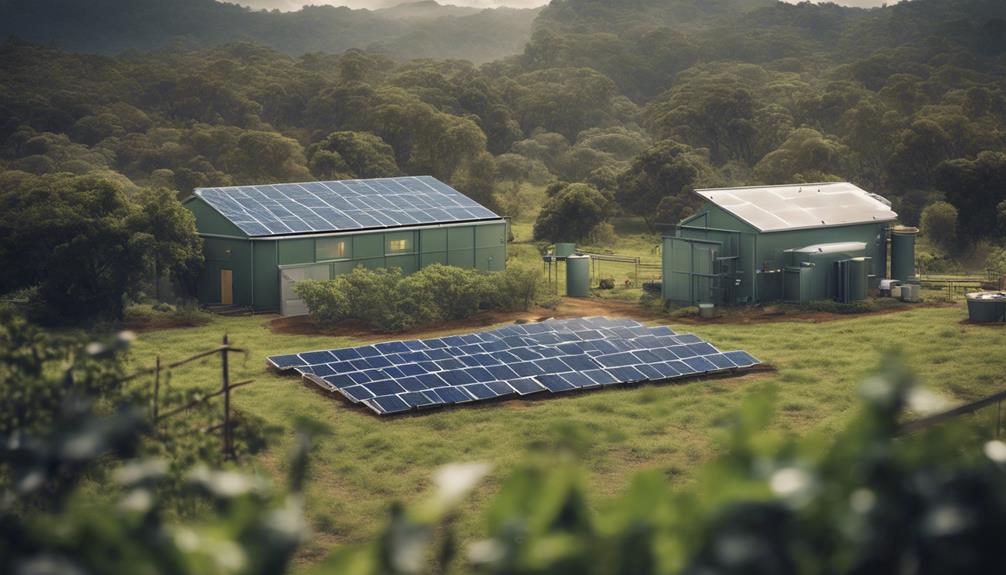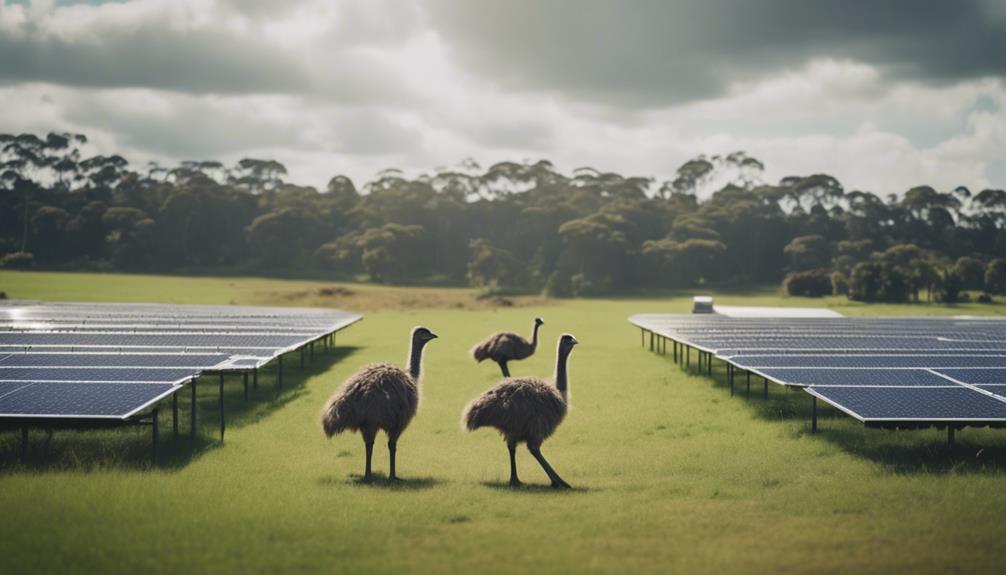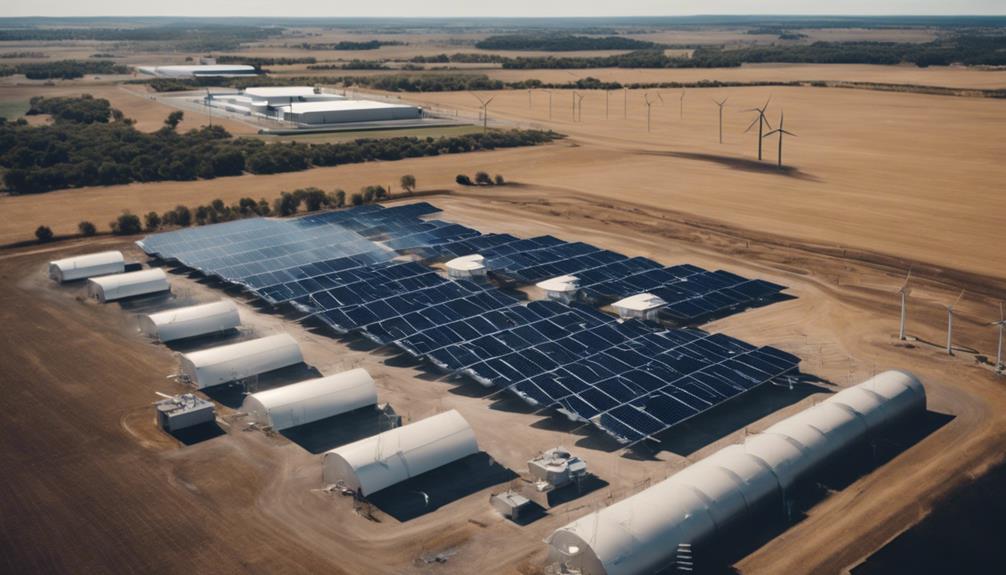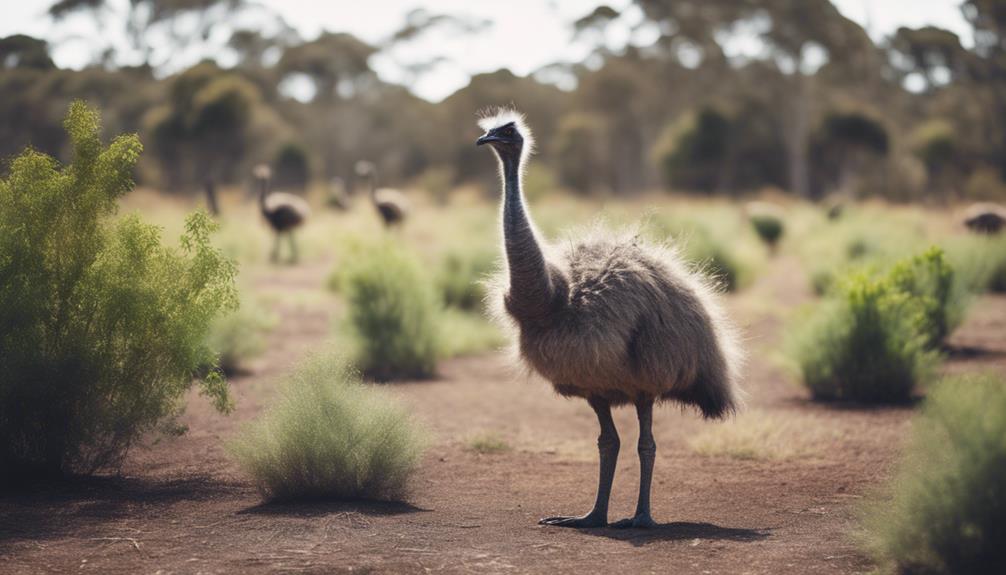
You might be thinking that implementing sustainable practices in emu farming could be too costly or complicated, but the benefits far outweigh any initial challenges. Embracing sustainability in emu farming not only ensures the well-being of your emus but also has a positive impact on the environment and the industry as a whole. Consider the ripple effect of your farming choices and how they can shape the future of emu farming. The journey towards sustainability in emu farming is both rewarding and essential for the longevity of the practice.
Key Takeaways
- Implement pasture rotation for soil fertility and emu health.
- Utilize water conservation methods like rainwater harvesting.
- Opt for organic feed options to enhance sustainability.
- Manage waste efficiently through recycling and composting.
- Adopt energy-efficient practices like solar panels and LED lighting.
Benefits of Sustainable Emu Farming

Embrace the numerous advantages of implementing sustainable emu farming practices to enhance environmental stewardship and economic viability in the agricultural sector. By transitioning to sustainable methods, you can reduce the carbon footprint of your farm operations while improving soil health and biodiversity. Sustainable emu farming involves practices such as rotational grazing, water conservation techniques, and natural pest control methods. These approaches not only benefit the environment but also contribute to the overall health and well-being of your emus.
Furthermore, sustainable emu farming can lead to increased profitability in the long run. By focusing on sustainable practices, you can lower input costs, enhance the quality of your emu products, and access niche markets that value sustainability. Consumers are becoming increasingly conscious of where their food comes from and how it's produced, making sustainable emu farming a powerful marketing tool. Embracing sustainability in your emu farming operations can position you as a leader in the industry and drive success for your business.
Organic Feed Options
Consider incorporating organic feed options into your emu farming practices to promote sustainability and enhance the quality of your emu products. Organic feed options are cultivated without synthetic pesticides, herbicides, or genetically modified organisms, ensuring a purer diet for your emus. By choosing organic feeds, you support environmentally friendly practices that prioritize soil health, biodiversity, and sustainable farming methods.
Organic feeds can include a variety of grains, seeds, and legumes such as organic corn, soybeans, and alfalfa. These ingredients are rich in essential nutrients, vitamins, and minerals, providing a balanced diet for your emus. Additionally, organic feeds are free from harmful chemicals, antibiotics, and artificial additives, reducing the risk of health issues and promoting overall well-being in your emu flock.
Incorporating organic feed options not only benefits your emus' health but also contributes to the production of high-quality emu products. Emus raised on organic feeds tend to have leaner meat with superior taste and nutritional value, appealing to consumers seeking premium, sustainable products. Make a powerful choice for your emu farming operation by embracing organic feed options for a more sustainable and eco-conscious approach.
Ethical Breeding Practices

Implementing ethical breeding practices in your emu farm operations ensures the well-being and genetic diversity of your flock, ultimately contributing to the long-term sustainability of your business. To uphold ethical standards, begin by conducting thorough research on the emu breeding process and selecting only reputable breeders to source your initial stock. Regular health assessments and genetic screenings are imperative to maintain a robust and disease-resistant flock. Implement a breeding program that prioritizes natural mating behaviors and avoids artificial insemination whenever possible, as this promotes the overall well-being of the emus.
Furthermore, it's essential to provide adequate living conditions that allow for natural social interactions among the emus. Encourage natural incubation of eggs by the female emus and allow them to raise their chicks, fostering strong familial bonds. By respecting the natural behaviors and instincts of these magnificent birds, you not only ensure their welfare but also enhance the quality of your flock, setting the foundation for a successful and sustainable emu farming venture.
Waste Management Strategies
To effectively manage waste on your emu farm, establishing a comprehensive system for recycling organic materials and implementing efficient composting practices is crucial. Begin by segregating waste into categories such as manure, leftover feed, and bedding materials.
Manure can be composted to create nutrient-rich fertilizer for your pastures. Utilize a designated area for composting, ensuring proper aeration and moisture levels to facilitate the decomposition process. Consider investing in a compost turning machine to expedite the breakdown of materials. Additionally, explore the option of vermiculture, using worms to further enhance the composting process and create valuable worm castings.
Incorporate a biosecurity plan to prevent the spread of diseases through waste management. Regularly monitor compost piles to ensure they reach adequate temperatures for pathogen destruction. Implementing a closed-loop system where composted materials are reused on the farm reduces the need for external inputs, promoting sustainability.
Pasture Rotation Techniques

For optimal land utilization and pasture health, incorporating strategic pasture rotation techniques is essential in maintaining the sustainability and productivity of your emu farm. By implementing proper pasture rotation, you can maximize your land's potential and ensure the health and well-being of your emus.
Here are three key benefits of utilizing pasture rotation techniques:
- Enhanced Soil Fertility: Rotating pastures allows for more balanced nutrient distribution in the soil. As your emus graze on different sections, the land gets a chance to recover, preventing overgrazing and promoting healthier grass growth.
- Reduced Parasite Load: Moving emus to fresh pastures regularly helps break the lifecycle of parasites present in the soil. This natural control method reduces the risk of parasite infestations and minimizes the need for chemical treatments.
- Improved Pasture Quality: Rotational grazing encourages diverse plant growth and prevents the dominance of undesirable species. This leads to a more nutritious diet for your emus and overall improved pasture quality.
Water Conservation Methods
Consider incorporating efficient irrigation systems to optimize water usage on your emu farm and enhance sustainability. Implementing drip irrigation or sprinkler systems can significantly reduce water wastage by delivering water directly to the roots of plants. Additionally, rainwater harvesting techniques can be employed to collect and store rainwater for later use in watering crops, reducing reliance on external water sources.
Installing moisture sensors in the soil can help you monitor the water levels accurately, ensuring that you provide just the right amount of water needed by your plants. Utilizing mulching techniques can also aid in water conservation by reducing evaporation from the soil surface and preventing weed growth, which competes for water with your crops.
Furthermore, consider investing in water-efficient equipment such as low-flow nozzles for hoses and automatic shut-off valves to prevent unnecessary water loss. Implementing these water conservation methods not only benefits the environment but also contributes to the long-term sustainability and profitability of your emu farm.
Energy-Efficient Facilities

Implementing energy-efficient practices in your facilities can significantly reduce operational costs and minimize environmental impact. By incorporating advanced technologies and strategies, you can create a more sustainable emu farming operation. Here are three key ways to enhance energy efficiency in your facilities:
- LED Lighting:
Switching to energy-efficient LED lighting can drastically reduce electricity consumption. LEDs are long-lasting and consume less power than traditional lighting options, making them a cost-effective and environmentally friendly choice.
- Solar Panels:
Installing solar panels on your farm can harness renewable energy from the sun, reducing reliance on non-renewable sources. This not only cuts energy costs in the long run but also reduces greenhouse gas emissions, aligning with sustainable farming practices.
- Energy-Efficient Equipment:
Upgrading to energy-efficient equipment such as pumps, heaters, and ventilation systems can lead to substantial energy savings. Look for appliances with high energy star ratings to ensure optimal efficiency and performance while minimizing energy wastage.
Integrated Pest Management
Maximize pest control efficiency and environmental sustainability by adopting integrated pest management practices on your emu farm. Integrated Pest Management (IPM) combines biological, cultural, physical, and chemical tools to manage pests effectively while minimizing environmental impact.
Start by monitoring pest levels regularly to identify potential issues early. Utilize natural predators like ladybugs or parasitic wasps to control pest populations biologically. Implement cultural practices such as rotating crops or adjusting planting times to disrupt pest cycles.
Employ physical barriers like nets or traps to prevent pest infestations. When necessary, use chemical controls judiciously and consider organic options to reduce harm to beneficial organisms. By integrating these strategies into your pest management plan, you can reduce reliance on synthetic pesticides, protect the environment, and maintain a healthy balance on your emu farm.
Embrace the power of integrated pest management to safeguard your farm's productivity and sustainability.
Wildlife Habitat Preservation

To enhance the biodiversity of your emu farm and promote ecological balance, prioritize the preservation of wildlife habitats through strategic land management practices. By preserving wildlife habitats on your farm, you not only support the local ecosystem but also create a more sustainable environment for your emus to thrive.
Here are three key strategies to help you effectively preserve wildlife habitats:
- Native Vegetation Restoration: Introduce native plant species on your farm to provide food and shelter for local wildlife. This restoration effort will attract a variety of insects, birds, and small mammals, contributing to a healthier ecosystem.
- Water Source Management: Ensure there are adequate water sources such as ponds or streams on your farm to support wildlife. By maintaining these water sources, you create habitats for amphibians, aquatic insects, and birds, enriching the biodiversity of your farm.
- Protected Areas: Designate specific areas on your farm as wildlife sanctuaries where no farming activities take place. These protected areas allow wildlife to thrive undisturbed, fostering a balanced and sustainable environment for both animals and emus.
Carbon Footprint Reduction
Enhancing the sustainability of your emu farm involves efficiently managing resources to reduce its carbon footprint. By implementing innovative practices, you can significantly decrease the environmental impact of your operations. One effective method is to optimize feed production and usage, as feed production contributes to a considerable portion of the carbon emissions in emu farming. Additionally, investing in renewable energy sources such as solar panels can help power farm operations sustainably.
To further guide you in reducing your farm's carbon footprint, refer to the table below that outlines practical steps you can take:
| Carbon Footprint Reduction Strategies | Description |
|---|---|
| Optimize Feed Production | Efficiently manage feed production processes. |
| Utilize Renewable Energy Sources | Invest in solar panels to power farm operations. |
| Implement Waste Management Systems | Properly dispose of waste to reduce emissions. |
| Promote Sustainable Transport | Use eco-friendly vehicles for on-farm tasks. |
| Adopt Precision Agriculture Techniques | Utilize technology to optimize resource use. |
Community Engagement Initiatives

Engage your local community in sustainable emu farming practices by fostering collaborative initiatives and sharing knowledge about responsible agricultural methods. Community engagement is crucial for the success of sustainable farming practices. Here's how you can effectively involve your community:
- Workshops and Training Sessions: Organize workshops to educate community members on sustainable emu farming techniques, such as organic feed options and natural habitat preservation.
- Demonstration Farms: Establish demonstration farms where locals can observe sustainable practices in action, fostering a culture of learning and innovation.
- Collaborative Projects: Partner with community organizations to implement eco-friendly initiatives like waste recycling or water conservation efforts, creating a sense of shared responsibility for environmental stewardship.
Certification and Compliance Requirements
Pivoting from community engagement initiatives to certification and compliance requirements in sustainable emu farming practices involves ensuring that the necessary standards and regulations are met to uphold the integrity and sustainability of the industry. Certification serves as a testament to your commitment to best practices, environmental stewardship, and animal welfare.
To achieve this, familiarize yourself with certifications like the American Emu Association (AEA) Certified Emu, which guarantees adherence to strict guidelines ensuring the well-being of the emus and the environment. Compliance with regulations such as those set by the USDA is crucial to maintaining the quality and safety of emu products.
Embrace innovation by exploring new technologies that can streamline compliance processes, such as digital record-keeping systems or automated monitoring tools. Stay informed about evolving standards and be proactive in adapting your practices to meet or exceed these requirements. By prioritizing certification and compliance, you not only elevate your farm's reputation but also contribute to the long-term sustainability of the emu farming industry.
Frequently Asked Questions
Can Emus Be Effectively Used for Weed Control on the Farm?
Emus can be an effective natural weed control solution on your farm. Their foraging behavior targets weeds, reducing the need for chemical herbicides. By strategically managing their grazing patterns, you can harness their weed-clearing power efficiently.
How Can Emu Farming Contribute to Biodiversity Conservation?
To contribute to biodiversity conservation, consider emu farming's impact. Your efforts can increase habitat diversity by managing vegetation with emus. With care, you help preserve ecosystems, fostering a more balanced and sustainable environment.
Are There Any Specific Health Benefits Associated With Emu Products?
You'll be pleased to know that emu products offer numerous health benefits. Emu oil is rich in omega fatty acids, antioxidants, and anti-inflammatory properties. It can aid in reducing inflammation, hydrating skin, promoting wound healing, and more.
What Are the Challenges Involved in Processing Emu Meat and Oil Sustainably?
You face the challenge of balancing efficiency and conservation in processing emu meat and oil sustainably. Innovate with technology to reduce waste, improve energy use, and ensure ethical practices. Strive for harmony between profitability and eco-friendliness.
How Do Emus Impact Soil Health in Rotational Grazing Systems?
Emus impact soil health positively in rotational grazing systems by naturally aerating the soil with their strong feet, aiding in nutrient distribution, and reducing soil compaction. This enhances soil fertility and overall pasture sustainability.
Conclusion
In conclusion, by implementing sustainable practices in emu farming, you're like a skilled artist painting a masterpiece on a canvas of environmental stewardship.
With organic feed options, ethical breeding practices, and wildlife habitat preservation, you're creating a harmonious ecosystem where emus thrive.
By reducing your carbon footprint and engaging with the community, you're building a future where the industry can flourish in a responsible and sustainable manner.
Keep up the great work in nurturing both your emus and the environment!




